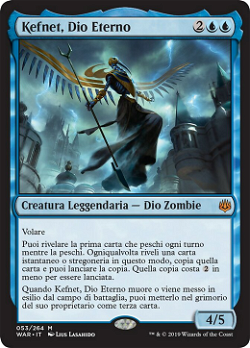Di Kefnet, Dio Eterno
Kefnet, Dio Eterno, Creatura leggendaria — dio zombie, progettato da Lius Lasahido rilasciato per la prima volta May, 2019 in redazione War of the Spark Promos ed è stato stampato esattamente in 3 forme diverse. Guarda il gioco 1 formati: Commander. È una chiave magnetica 10 combos.
Dio-Eterno Kefnet sarebbe un'aggiunta preziosa a un mazzo di controllo che si concentra sull'estrazione e sul lancio di istantanei e stregonerie, poiché fornisce un vantaggio di carte e il potenziale per una potente duplicazione delle magie a un costo ridotto. Anche se potrebbero esserci altre carte che offrono effetti simili, come Snapcaster Mage o Torrential Gearhulk, la capacità di Kefnet di copiare ripetutamente le magie senza essere esiliato permanentemente lo rende un forte candidato per essere incluso nei mazzi che si basano sulla sinergia delle magie. Nel complesso, Dio-Eterno Kefnet è una carta versatile e potente che potrebbe essere giocata nel mazzo giusto.
Rugole
03/05/19
If one of these Gods leaves the graveyard or exile while its last ability is on the stack, it will remain in its new zone, even if that zone is a graveyard or exile.
03/05/19
If the card leaves your hand before Kefnet’s triggered ability resolves, you’ll copy it using its last known information.
03/05/19
If you control another player’s God when it dies, you decide whether to put that card into its owner’s library.
03/05/19
If you reveal a card this way, it remains revealed until Kefnet’s triggered ability finishes resolving.
03/05/19
In a multiplayer game, if you put another player’s God onto the battlefield under your control, it will be exiled as you leave the game. If you were still the controller of that God, you would control its triggered ability but you have left the game; that ability won’t resolve and the card remains in exile. Similarly, if you lose the game at the same time that another player’s God that you put onto the battlefield is destroyed, it remains in its owner’s graveyard.
03/05/19
It’s important to reveal the first card you draw each turn (or choose not to reveal it) before it is mixed with the other cards in your hand. You look at the card as you draw it before choosing whether to reveal it.
03/05/19
Multiple card draws are always treated as a sequence of individual card draws. For example, if you haven’t drawn any cards yet during a turn and cast a spell that instructs you to draw three cards, you’ll draw them one at a time. Only the first card drawn this way may be revealed and copied with Kefnet’s ability.
03/05/19
To determine the total cost of a spell, start with the mana cost or alternative cost you’re paying, add any cost increases, then apply any cost reductions (such as that of Kefnet’s ability). The converted mana cost of the spell remains unchanged, no matter what the total cost to cast it was.
03/05/19
You can cast the copy only as Kefnet’s triggered ability resolves. If you don’t want to cast it at that time (or you can’t cast it, perhaps because there are no legal targets available), the copy ceases to exist. You can’t cast it later.


— Commenti 0
, Reazioni 1
Diventa il primo a commentare